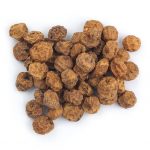Cyperus Esculentus or Tiger nut or Aki or Aya (Hausa) or Ofio (Igbo) or Imumu (Yoruba): Another underutilized plant in Africa
Tiger nut is a tuber that has been used for centuries in a many parts of Africa. The ancient Egyptians, one of the most important civilisations of history used this magnificent food for its curative and regenerative properties. Proof of this value given, is that Tiger nuts have been found in ancient sarcophagus. Egyptians are known to have been buried with their most valued possessions from those times or even before with other civilisations. Tiger nuts have been a fundamental part of a stable and healthy diet. Different studies carried out in Europe, thanks to the occupation of the Arabs in the Iberian Peninsula, who cultivated in the Valencia Community, endorse the properties and the intrinsic nutrients of this tuber, explaining the reduction of heart disease and improving gastrointestinal functions and digestion due to its high natural fibre content. Tiger nut has been demonstrated to contain higher essential amino acids than those proposed in the protein standard by the FAO/WHO for satisfying adult needs. Therefore, tiger nut, with its inherent nutritional and therapeutic advantage, could serve as good alternative to cassava in the baking industry. Tiger nut has a rough and rounded form, and earthly colour as it is found underground until it is harvested for its consumption. The plant itself has a very characteristic intense green coloured leaf, which can be seen along the Valencia coast, West and South African Countries.
The plant is most frequently found inhabiting wet marshes and edges of streams and ponds where it grows in coarse tufts. Tiger nut tubers are daily ingredients of the diet of many people in North Africa and Spain. In North Africa, the tubers are consumed in their natural form or after being soaked in water for some hours. In Spain, the tubers are consumed mainly as a drink called locally “horchata de chufa” (chufa milk).
In Nigeria, Tiger nut is available in fresh, semi-dried and dried form in the markets where it is sold locally and consumed even uncooked. Tiger nuts are under-utilized due to lack of information on their nutritional potential. Tiger nut is usually sown in April and picked in November. There are mainly three varieties namely: black, brown and yellow, but only yellow and brown are readily available on the Nigerian markets. The yellow variety is preferred to all other varieties because of its inherent properties like its bigger size, attractive colour and fleshier body. The yellow variety also yields more milk, contains lower fat and higher protein and less anti-nutritional factors. The level of anti-nutrients such as tannins and alkaloids are drastically reduced by soaking the nuts in water for 6 hours, thereby making them free from these substances, especially in making milk Tiger nut or flour.
It is a good alternative to many other flours like wheat flour as it is gluten free and good for people who cannot take gluten in their diets (celiac disease). It is also used in the confectionery industry. It is considered good flour or additive for the bakery industry, as its natural sugar content is fairly high, avoiding the necessity of adding too much extra sugar. Also, it can be used as a flavouring agent for ice cream and biscuits. Some Spanish companies produce flour from the Tiger nut that is being used for confectionery baking, breakfast and brunch (muesli or flakes) and bakeries for specialist diets. It is considered very healthy due to its high level of beneficial ingredients that are very good for the organism.
Furthermore, these companies have developed a technology for producing peeled Tiger nuts that have a delicious taste and can be presented to the consumer in many ways: Covered in chocolate, caramel coated, in an assortment of dried fruits or in any other imaginable form. The fatty acids profile of the edible and stable oil obtained from the tuber of the Tiger nut is comparable to olive, which is, having about 68% of oleic acid. The oil is golden brown in colour and has a rich, nutty taste. The oil remains in a uniform liquid form at refrigeration temperature.
This makes the oil suitable for salad making. Apart from oleic acid, Tiger nut oil contains the essential polyunsaturated fatty acids – linoleic acid and linolenic acid. In fact, consuming about 10 g of the oil can meet ones daily recommended intake of these fatty acids. The oil also has higher oxidative stability than many other oils, because it is richer in vitamin E. It is regarded as high quality oil due to its extraction without adding any external heat (cold pressed oil) and is highly recommended for cooking over other oils because it is more resistant to chemical decomposition at high temperatures. Because of the presence of oleic acid and the essential polyunsaturated fatty acids, consuming the oil decreases blood concentrations of triglyceride, total cholesterol and bad cholesterol (LDL), but increases the level of the good cholesterol (HDL).
Tiger nut is used for the production of beverages among African cultures and by the Spaniards. Horchata of Tiger nuts or Tiger nuts Milk is vegetable milk that is derived from the Tiger nut. It is a typical Spanish drink that is very refreshing and has a sweet taste. It is an alternative to cow’s or soya milk.
Tiger nut milk/beverage/drink commonly called ‘kunnun aya’ in Northern Nigeria is a healthy drink with many nutrients. It is a nourishing and energetic product recommended by experts to be taken during any season of the year, especially in dry season when the sun is hot. It is a rich source of nutrients such as, vitamins C and E as well as minerals such as, phosphorus, magnesium, potassium, calcium and iron. The high content of magnesium and potassium as well as very low content of sodium makes “kunnun aya” a suitable beverage for people with hypertension or elevated blood pressure. In fact, this drink contains more iron, magnesium and carbohydrates than the cow’s milk.
It has also the advantage of not containing lactose (milk sugar) and casein (milk protein) of milk, and as a plant, does not any cholesterol, and is therefore an ideal drink for people who do not tolerate lactose or are allergic to cow’s milk protein. Furthermore, sugar-free Tiger nut milk is suitable for diabetic people and also helps in weight control.
Tiger nut is recommended for people, who suffer from indigestion, flatulence and diarrhea, because it provides digestive enzymes like the catalase, lipase and amylase. The high content of oleic acid has positive effect on cholesterol, thereby preventing heart attacks, thrombosis and activates blood content of soluble glucose. Tiger nut reduces the risk of colon cancer. It prevents constipation.
Tiger nut contains a good quantity of vitamin B1, which assists in balancing the central nervous system and helps to encourage the body to adapt to stress. In China, Tiger nut milk is used as a liver tonic, heart stimulant and drank to heal serious stomach pain, to promote normal menstruation, to heal mouth and gum ulcers.
It is used in Ayurvedic medicine and is a powerful aphrodisiac (sexual stimulant) and improves sperm count. According to popular tradition in Valencia in Spain the Horchata de chufa (Tiger nut milk) is considered an effective remedy for diarrhoea. It promotes the production of urine and this is why it is a preventive measure for cyst, prostrate, hernia, rectum deformation and prolapsed (anal feature-small painful flesh at the tip of the anus) and to prevent endometriosis (abnormal growth of cells lining the uterus) or fibrosis (excess fibrous connective tissue in an organ or tissue) as well as blockage of the tip of the fallopian tube.

Credit: realfoodsource. com
The black species of the Tiger nut is an excellent medicine for breast lumps and cancer. The tubers have a relatively high total antioxidant capacity, because they contain considerable amounts of polyphenols. Consumption of antioxidants could protect the immune system of malnourished populations.
These are the thoughts of:
Sa’eed Halilu Bawa
Senior Lecturer (Associate Professor) at University of the West Indies, St. Augustine Campus, Trinidad.
Studied Food and Nutrition Sciences, Dietetics at Kaduna Polytechnic, Nigeria; Warsaw University of Life Sciences, Poland.
























